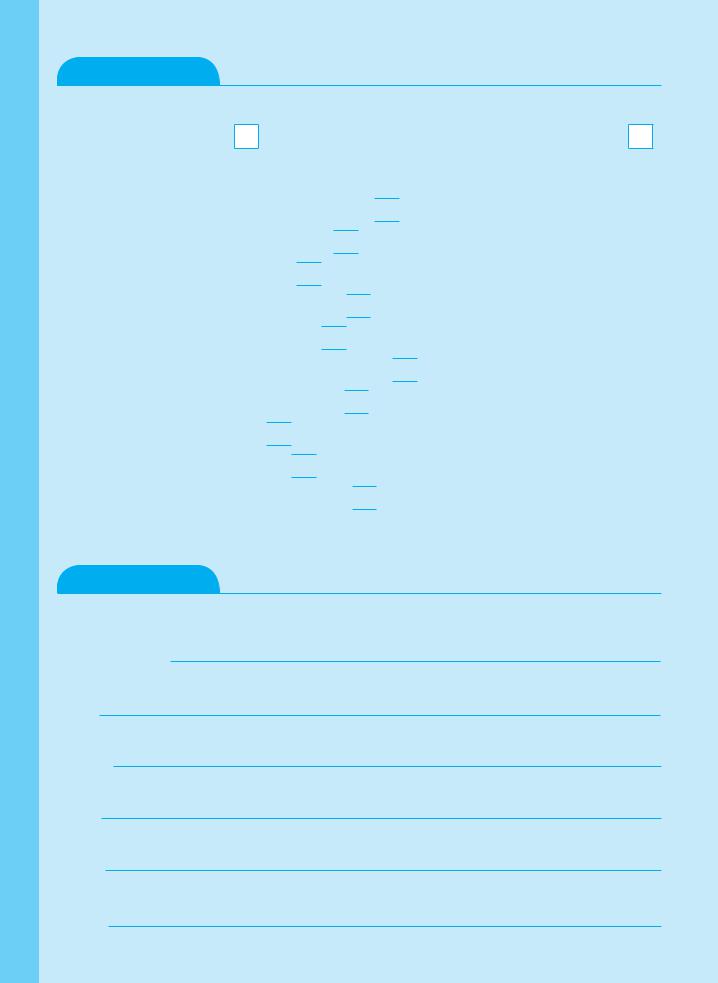
- •Note to the Student from the Publisher
- •1 Nouns
- •2 Pronouns
- •3 Adjectives
- •4 Determiners
- •5 Verbs and Tenses
- •6 Auxiliary Verbs
- •7 Adverbs and Adverb Phrases
- •8 Prepositions and Prepositional Phrases
- •9 Conjunctions
- •10 Sentences
- •11 Direct and Indirect Speech
- •12 Punctuation
- •A List of Irregular Verbs

2 Pronouns
A pronoun is a word that takes the place of a noun. There are different kinds of pronouns.
Personal Pronouns
Personal pronouns may be used as:
nthe subject of a verb, or
nthe object of a verb.
Subject Pronouns
The subject of a verb does the action of the verb. The personal pronouns
I, you, he, she, it, we and they can all be used as the subject of a verb. Study the following two sentences:
Lisa likes cats. She has four cats.
In the first sentence, the proper noun Lisa is the subject of the verb likes. In the second sentence, the pronoun she is the subject of the verb has.
Here are some more pairs of sentences that show personal pronouns used as subjects of verbs.
My name is Michael. I am fourteen.
My father works hard. He works in a factory.
My sister is older than me. She is twelve.
Our dog is very naughty. It likes to chase cats.
Bob, you are a bad dog!
David and I are playing football. We like sports.
Jim and Jeff are my brothers. They are older than I am.
24

Pronouns: Personal Pronouns
Object Pronouns
The object of a verb receives the action of the verb. The personal pronouns me, you, him, her, it, us and them can all be used as the object of a verb. Look at the following two sentences:
Lisa likes cats. She likes to stroke them.
In the first sentence, the noun cats is the object of the verb likes. In the second sentence, the pronoun them is the object of the verb stroke.
Here are some more pairs of sentences that show personal pronouns used as objects of verbs.
I’m doing my homework. Dad is helping me.
Goodbye, children! I’ll call you later.
Where is John? I need to speak to him.
Miss Garcia is very nice. All the children like her.
The car is very dirty. Mom is cleaning it.
Uncle Harry called Mary to ask her a question.
My chocolates are all gone. Someone has eaten them.
First Person, Second Person and Third Person
In grammar, the person who is speaking is called the first person. The one spoken to is called the second person, and the one spoken about is called the third person.
Here is a table to help you remember which pronouns to use.
|
|
|
|
|
|
subject |
object |
|
|
|
|
|
|
|
first person singular |
|
|
|
|
I |
me |
|||
second person singular |
you |
you |
||
third person singular |
he |
him |
||
|
she |
her |
||
|
it |
it |
||
|
|
|
|
|
first person plural |
we |
us |
||
second person plural |
you |
you |
||
third person plural |
they |
them |
||
25

Pronouns: Reflexive Pronouns
Reflexive Pronouns
Reflexive pronouns are words that refer to the noun or pronoun that is the subject of the verb. The words myself, yourself, himself, herself, itself, ourselves, yourselves and themselves are reflexive pronouns.
My brother built this computer himself.
Be careful not to cut yourself with that knife.
John was looking at himself in the mirror.
Kate fell and hurt herself.
Our cat washes itself after every meal.
We baked the cake by ourselves.
Come in, everybody, and find yourselves a seat.
The children cleaned their room all by themselves.
Bears like to rub themselves against a tree.
The bird washed itself by splashing in a puddle.
The players train every day to keep themselves fit.
Have yourselves a good time.
Here is a table to help you remember which reflexive pronoun to use with which personal pronoun.
|
|
|
|
|
singular personal |
reflexive |
|
plural personal |
reflexive |
pronoun |
pronoun |
|
pronoun |
pronoun |
|
|
|
|
|
I (subject pronoun) |
myself |
|
we (subject pronoun) |
ourselves |
|
||||
me (object pronoun) |
myself |
|
us(object pronoun) |
ourselves |
you (subject/object |
yourself |
|
you (subject/object |
yourselves |
pronoun) |
|
|
pronoun) |
|
he (subject pronoun) |
himself |
|
they (subject pronoun) |
themselves |
him (object pronoun) |
himself |
|
them (object pronoun) |
themselves |
she (subject pronoun) |
herself |
|
|
|
her (object pronoun) |
herself |
|
|
|
it |
itself |
|
|
|
26

Pronouns: Possessive Pronouns; Demonstrative Pronouns
Possessive Pronouns
Possessive pronouns are used to talk about things that belong to people. The words mine, yours, his, hers, ours and theirs are possessive pronouns.
This book is mine.
Have you lost yours, Tom?
This pen is mine and that one is his.
Sarah has lost her cat. Is this cat hers?
I can see our car, but where is yours?
We’ve had our lunch, but they haven’t had theirs.
Here is a table to help you remember which possessive pronoun to use with which personal pronoun.
|
|
|
|
|
singular personal |
possessive |
|
plural personal |
possessive |
pronoun |
pronoun |
|
pronoun |
pronoun |
|
|
|
|
|
I, me |
mine |
|
we, us |
ours |
|
||||
you |
yours |
|
you |
yours |
he, him |
his |
|
they, them |
theirs |
she, her |
hers |
|
|
|
Demonstrative Pronouns
Demonstrative pronouns are used for pointing out things. The words this, that, these and those are demonstrative pronouns.
This is my desk.
This is the Mings' house. That is my friend’s house. That’s my mother’s car.
You’ll have to work harder than this. We can do better than that.
It’s raining again. This is awful! Who is that knocking at the door? Hi, Kathleen. This is Michael.
These are my pets.
These are sheep but those are goats. Those are horses.
N o t e s
nUse this and these when you are talking about things near you.
nUse that and those when you are talking about things farther away.
27

Pronouns: Interrogative Pronouns; Indefinite Pronouns
Interrogative Pronouns N o t e s
Interrogative pronouns are used to ask questions. The words who, whose, what, which and whom are
nIn writing and formal speaking, you can also use whom as the object of verbs and prepositions. For example:
interrogative pronouns.
Who used all my paper?
Whom did the president criticize?
Whom is the principal talking to? or
To whom is the principal talking?
Who is Mom talking to?
Who are those people?
Whose pen is this?
Whose are these shoes?
What is your brother’s name?
What does Tom want?
What is the date today?
What do you want to be when you grow up?
Which of these desks is yours?
but you cannot use whom as the subject of a verb. So you cannot say:
Whom came to the party last night?
You have to say:
Who came to the party last night?
nWho can be used as the subject or the object of a verb. For example:
Who broke the window? (as the subject) Who are you inviting to your party?
(as the object)
nWho can be used as the object of a preposition. For example:
Who is Mom talking to?
nYou can also use whom as the object of a preposition. For example:
Which do you prefer?
Which of your sisters is the tallest?
Whom did the President criticize?
Whom is Mom talking to?
If you put the preposition before the interrogative pronoun, you must use whom:
To whom is Mom talking?
Inedefinite Pronouns
An indefinite pronoun does not refer directly to any other word. Most indefinite pronouns express he idea of quantity.
Everybody is welcome at the meeting.
Many prefer their coffee with sugar.
Does anybody care for a cheese sandwich?
Few choose to live in the arid desert.
28

Pronouns: Indefinite Pronouns
Indefinite Pronouns
all |
each |
most |
other |
another |
either |
neither |
several |
any |
everybody |
nobody |
some |
anybody |
everyone |
none |
somebody |
anyone |
few |
no one |
someone |
both |
many |
one |
such |
The pronoun they is considered an indefinite pronoun when it makes an indefinite reference.
They produce a lot of coal in your state.
Why don't they repair the bad roads?
Exercise 1
Read the following passage. Write the missing subject and object pronouns in the blank spaces.
My name is Charlie. |
|
|
|
|
|
have two brothers. |
|
|
|
|
|
|
are both older than |
|||||||||
|
|
|
. Sometimes they take me to the park and |
|
|
|
|
|
|
play football |
||||||||||||
together. I like playing football with |
|
|
|
because they are very good. We are |
||||||||||||||||||
going to the park today. Would you like to come with |
|
|
? |
|
|
|
|
|
can |
|||||||||||||
all play together. Afterwards, |
|
|
can come to my house if |
|
|
|
|
want |
||||||||||||||
to. I think |
|
|
|
|
will like my dad. He is very funny and |
|
|
|
|
|
|
makes great |
||||||||||
pizzas. Do |
|
|
|
|
like pizza? |
|
|
|
|
|
|
|
||||||||||
29

Exercise 2
Some of the reflexive pronouns in the following sentences are used correctly, but some are not. Put a checkmark in the box if the reflexive pronoun is correct. Put an x in the box if it is not correct. Then write the correct reflexive pronoun in the blank space.
1.Sometimes I wash the dishes all by himself 

 .
.
2.Dad had an accident. He cut herself 

 with a knife.
with a knife.
3.Sally washes the car by herself 

 .
.
4.Do you think the doctor can cure itself 

 when he is ill?
when he is ill?
5.The cat stays clean by licking itself 

 .
.
6.Anna and May made the dinner all by herself 

 .
.
7.Mom lets me walk to school by myself 

 .
.
8.Can you dress themselves 

 , boys and girls?
, boys and girls?
9.David can swim all by himself 

 now.
now.
10.This light is automatic. It switches itself 

 on at night.
on at night.
Exercise 3
Write a short sentence using each of the interrogative pronouns below.
Example: Who Who is this man?
Who
Whose
What
Which
Whom
30

Exercise 4
Read the following passage. Write the missing demonstrative pronouns in the blank spaces.
Henry and I went for a walk on the beach. “What’s |
|
|
|
over there?” I asked. “It |
||
looks like broken glass,” said Henry. He gave me a bag. “Put it in |
|
|
,” he said. I |
|||
put the broken glass into the bag. “We’d better put |
|
|
|
in the trash,” I said. He |
||
took the bag from me. “You have to hold it like |
|
|
,” said Henry, “so that you |
|||
don’t cut your hand.” |
|
|
|
|
|
|
Exercise 5
Write the missing possessive pronouns in the blank spaces to complete the sentences.
1. |
I chose this seat first so it’s |
|
|
|
. |
|
|
|
. |
|
|||||
2. |
|
Can we borrow your coloring pens? We’ve lost |
|
|
|
|
|||||||||
|
|
|
|||||||||||||
3. |
We live in the city and they live in the countryside. Our house is smaller than |
||||||||||||||
|
|
|
. |
|
|
|
? |
|
|
|
|
|
|
|
|
4. |
|
John, is this pencil |
|
|
|
|
|
|
|
|
|
? |
|
||
|
|
|
|
|
|
|
|
|
|
||||||
5. |
|
Sally is looking for her gloves. Are these gloves |
|
|
|
|
|||||||||
|
|
|
|
||||||||||||
6. |
Can Julie use your bike? |
|
|
|
is broken. |
|
|
and his was |
|||||||
|
|
|
|
|
|||||||||||
7. |
Tom got the books mixed up. He thought mine was |
|
|
|
|||||||||||
|
|
|
|||||||||||||
|
|
|
. |
|
|
|
|
|
|
|
|
|
|
|
|
Exercise 6
Circle at least one indefinite pronoun in each sentence.
1.One never knows who might be listening.
2.Many are called but few are chosen.
3.I finished my cookie and asked for another.
4.Both were punished for the crime they commited.
5.Several applied for the job, but no one was hired.
31
